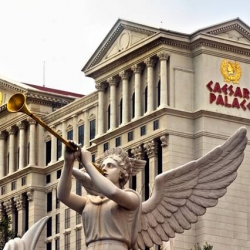Caesars Entertainment Corporation announced on Tuesday that the Missouri Gaming Commission and the Louisiana Gaming Control Board each have given their approval to the CEOC bankruptcy organization plan. The two gaming regulators’ approval was need for the CEOC reorganization to proceed.
Lousiana and Missouri were the final two states to give approval to the bankruptcy organization plan for the Caesars Entertainment Operations Corporation, better known as CEOC. The operations division of Caesars Entertainment entered bankruptcy in January 2015, but junior creditors filed a lawsuit that left the bankruptcy plan in legal limbo for years.
The approval clears a major hurdle on the restructuring of CEOC, but it also puts Caesars Entertainment Corporation one step closer to its planned merger with Caesars Acquisition. If all goes well, the long bankruptcy and restructuring could be completed over the next two weeks.
CEOC Reorganization Plan
CEOC held $18 billion of Caesar Entertainment’s $23 billion in debt. At several points during the CEOC lawsuit process, Caesars’ executives claimed the parent company might have to declare bankruptcy, if the CEOC reorganization plan was not accepted by the courts. In January 2017, former Judge Benjamin Goldgar — the mediator in the lawsuit — agreed to a plan between Caesars and its junior shareholders to proceed with the reorganization plan.
Since then, Caesars sought approval from the gaming regulators of all the states in which they operate: Nevada, New Jersey, Mississippi, Iowa, Illinois, Indiana, Pennsylvania, and Maryland. Such approval includes necessary licenses, as well as approval from states’ regulatory agencies.
Caesars Entertainment and Caesars Acquisition Merger
With the last states signing onto the reorganziation plan, Caesars Entertainment Corporation and Caesars Acquisition are one step closer to a merger. Stockholders for the two companies previously voted to approve the merger. To complete the restructuring, several customary closing conditions need to be met.
The closing conditions icnluding real estate transactions, internal and third party transfers, and a variety of other financial activities. While a merger is complicated, it is believed most of the serious obstacles have been cleared and the remaining conditions are mostly paperwork. The CEOC restructuring has been complicated and contentious, including the resignation of one judge (Joseph Farnan) overseeing the case.
Caesars Entertainment Casino Holdings
Caesars Entertainment Corporation announced that it expects to complete the merger and reorganization in the first week of October. If so, then Caesars Entertainment could become a major player in several upcoming casino licensing processes. Caesars wants a Toronto casino license, while it has dabbled with building a casino in South Korea.
Along with 8 properties on or near the Las Vegas Strip, Caesars Entertainment owns more brick-and-mortar casinos in the United States than any other casino company. It owns 35 U.S.-based casinos spread over 10 US states. Caesars Entertainment Corporation also owns 14 international casinos, including 10 brick-and-mortar gaming operations in the United Kingdom.
Vegas Strip Casino Giants
The company fell behind its chief Las Vegas Strip competitors — MGM Resorts, Wynn Resorts, and Las Vegas Sands Corporation — after those three companies invested early in the Macau casino industry. Meanwhile, Caesars (then named Harrah’s Entertainment) was purchased in January 2008 by Apollo Global Management and TPG Capital in a leveraged buyout.
Caesars Entertainment Buyout and Bankruptcy
The buyout left Caesars/Harrah’s with crippling debt after the stock market crash of September 2008 and the Global Recession which ensued for the next several years. Former CEO Gary Loveman was beset with rumors of insolvency and bankruptcy over the years, which certainly did not help the company gain new gaming licenses. The closure of Caesars properties like the Grand Tunica Casino in Mississippi and the Showboat in Atlantic City did not help the rumors.
When CEOC declared bankruptcy 5 months after Caesars move 12 casinos out of the division, junior creditors holding about 20% of the company’s shares sued. They claimed Caesars robbed CEOC of its assets, then left their junior shareholders holding roughly $9 billion of the company’s debt. The resulting lawsuit saw several judgments go against Caesars, which eventually led to $5 billion changing hands.
Despite its recent troubles, Caesars Entertainment remains the 4th-largest casino company in the world. The company owns world famous Vegas Strip casinos like Caesars Palace, Paris Las Vegas, Planet Hollywood Casino, and the Linq. Caesars also owns the Rio All-Suite Hotel and Casino in Paradise, Nevada, which has been home to the annual World Series of Poker since 2005.
At present, Caesars Entertainment owns two Louisiana casinos, Harrah’s Louisiana Downs in Bossier City and Harrah’s New Orleans, as well as one Missouri casino, Harrah’s North Kansas City.

